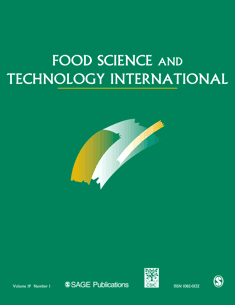
FOOD SCIENCE AND TECHNOLOGY INTERNATIONAL
Scope & Guideline
Connecting professionals to the latest in food science advancements.
Introduction
Aims and Scopes
- Food Safety and Microbial Control:
Research exploring methods to ensure food safety, including studies on the inactivation of pathogens, antimicrobial packaging, and the use of novel preservation techniques such as high-pressure processing, cold plasma, and natural antimicrobials. - Nutritional Enhancement and Functional Foods:
Studies focusing on the enhancement of nutritional profiles of food products through the incorporation of functional ingredients, such as probiotics, dietary fibers, and bioactive compounds derived from natural sources. - Innovative Food Processing Techniques:
Research on modern food processing technologies, including non-thermal methods, extrusion, and encapsulation techniques aimed at improving food quality, shelf-life, and consumer acceptance. - Plant-Based and Alternative Proteins:
Exploration of plant-based ingredients and alternative protein sources, including studies on the formulation, sensory evaluation, and nutritional analysis of meat analogs and gluten-free products. - Food Packaging and Preservation Techniques:
Investigations into smart and biodegradable food packaging systems that enhance food preservation while minimizing environmental impact, including the use of natural polymers and active packaging materials. - Sensory Evaluation and Consumer Acceptance:
Research on sensory properties of food products and consumer preferences, utilizing various methodologies to assess the impact of formulation changes on taste, texture, and overall acceptance.
Trending and Emerging
- Sustainable and Eco-Friendly Practices:
There is an increasing emphasis on sustainability in food production, packaging, and processing, with studies exploring biodegradable materials, waste reduction, and sustainable sourcing of ingredients. - Plant-Based Innovations:
A significant trend is the development of plant-based food products, with research focusing on alternative proteins, meat analogs, and the health benefits of plant-derived ingredients. - Smart Food Packaging Solutions:
Emerging technologies in food packaging, such as smart labels and active packaging systems that monitor freshness and enhance shelf life, are becoming a focal point of research. - Health and Wellness Products:
Growing consumer interest in health and wellness is driving research into functional foods, nutraceuticals, and products that offer health benefits beyond basic nutrition. - Advanced Food Processing Technologies:
Innovative processing techniques, including non-thermal methods, ultrasound, and high-pressure processing, are being increasingly explored for their ability to improve food quality and safety.
Declining or Waning
- Traditional Fermentation Techniques:
While fermentation remains a key area, the focus on traditional methods appears to be waning in favor of modern, innovative approaches that emphasize efficiency and scalability. - Chemical Preservatives:
Research on synthetic chemical preservatives is decreasing, as there is a growing consumer preference for natural preservation methods and clean-label products. - Conventional Food Processing Methods:
There is a noticeable decline in studies centered on conventional methods such as canning and pasteurization, as newer technologies gain prominence due to their advantages in quality retention and safety. - Animal-Based Food Products:
Interest in animal-based food products is diminishing in favor of plant-based alternatives, reflecting broader dietary trends and consumer preferences for sustainability. - Basic Nutritional Studies:
Research focusing solely on basic nutritional analysis without application to functional foods or health benefits is becoming less frequent, as the field shifts towards more applied and innovative nutritional solutions.
Similar Journals

Journal of Future Foods
Empowering interdisciplinary dialogue in food science.Welcome to the Journal of Future Foods, a prominent peer-reviewed publication dedicated to advancing knowledge and innovation within the realms of Agricultural and Biological Sciences, Food Science, and Nutrition and Dietetics. Published by KEAI PUBLISHING LTD in China, this journal has rapidly achieved a distinguished reputation, reflected in its impressive Q1 category ranking for both Agricultural and Biological Sciences and Food Science, along with a strong standing in Nutrition and Dietetics. The journal, which spans the period from 2021 to 2025, is committed to fostering interdisciplinary research that addresses the challenges and opportunities presented by the future of food. With a focus on open access, the Journal of Future Foods aims to disseminate crucial findings and foster collaborative dialogue among researchers, professionals, and students alike. By submitting your work, you not only contribute to cutting-edge advancements in the field but also join a vibrant community engaged in redefining the future of food systems.
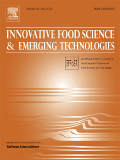
Innovative Food Science & Emerging Technologies
Driving Progress in Food Science and Emerging TechnologiesWelcome to Innovative Food Science & Emerging Technologies, a premier journal published by ELSEVIER SCI LTD that serves as a vital platform for researchers and professionals dedicated to the rapidly evolving field of food science. With an impressive Impact Factor and a position in the Q1 category across notable disciplines including Chemistry, Food Science, and Industrial and Manufacturing Engineering, this journal ranks among the top tier within its fields, evidenced by its Scopus ranking of 20th out of 389 in Food Science, placing it in the 94th percentile. Our readers can expect to encounter cutting-edge research and innovative applications from 2000 through 2024, exploring critical themes that contribute to advancements in food technology, manufacturing processes, and sustainability practices. Although currently not an Open Access publication, we maintain a commitment to disseminating high-quality scholarship that enhances knowledge and encourages collaboration among a diverse audience. Join us in driving forward the forefront of food science research in the Netherlands and beyond.

Foods
Pioneering Sustainable Solutions in Food Research.Foods is a premier open access journal published by MDPI, based in Switzerland, that has been at the forefront of disseminating high-quality research in the fields of food science, health professions, and plant science since its establishment in 2012. With an impressive convergence of interdisciplinary studies spanning various aspects of food, nutrition, and microbiology, the journal aims to provide a comprehensive platform for researchers and professionals to share innovative ideas and findings. Maintained as a Q1 journal in multiple categories for 2023, including Food Science and Health Professions, Foods has garnered significant recognition within the academic community, reflected in its strong Scopus rankings and percentiles across various disciplines. The journal not only promotes open access to enhance the visibility and accessibility of research but also encourages the exploration of sustainable food systems and health-related issues, thus contributing to essential discussions in today's society. For those looking to advance their understanding and expertise in food-related sciences, Foods serves as an enduring resource for groundbreaking studies and critical insights.

JOURNAL OF FOOD SCIENCE AND TECHNOLOGY-MYSORE
Driving Progress in Food Science for a Healthier WorldJOURNAL OF FOOD SCIENCE AND TECHNOLOGY-MYSORE, published by SPRINGER INDIA, is a distinguished peer-reviewed journal that has been contributing to the ever-evolving field of food science since its inception in 1974. With an ISSN of 0022-1155 and E-ISSN 0975-8402, this journal holds a commendable position in the Q2 category for Food Science, as per the 2023 metrics, and ranks #58 out of 389 in Scopus's Agricultural and Biological Sciences sector, achieving an impressive 85th percentile. The journal publishes high-quality research articles, reviews, and case studies that cover a wide array of topics, from food preservation to innovative technologies in food processing. Although it is not an open-access journal, it endeavors to disseminate essential knowledge and research strategies that advance food science and benefit both industry professionals and academia. The geographical reach of the journal, alongside its rigorous editorial standards, solidifies its stature as a pivotal resource for researchers, professionals, and students dedicated to the enhancement of food science practices and technologies.

Future Foods
Shaping the next generation of food technologies.Welcome to Future Foods, a cutting-edge academic journal published by Elsevier, dedicated to advancing the field of food science. As a prestigious Q1 journal in the Food Science category, it ranks impressively as #43 out of 389 in Scopus, placing it in the 89th percentile among its peers. Future Foods aims to explore innovative developments in sustainable food systems, novel food products, and the intersection of technology and food production, thus providing a platform for research that addresses global challenges such as food security and nutrition. With its focus on future-oriented solutions and trends in the food industry, this journal is essential for researchers, professionals, and students who are eager to contribute to the discourse around cutting-edge food science. Situated in the Netherlands, the journal serves the international academic community and fosters collaboration and knowledge sharing in the realm of food innovation.
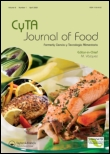
CyTA-Journal of Food
Transforming the food landscape with impactful research.CyTA-Journal of Food is a prestigious academic journal published by TAYLOR & FRANCIS LTD, dedicated to advancing the field of food science and technology through the dissemination of innovative research and practical knowledge. With an ISSN of 1947-6337 and an E-ISSN of 1947-6345, this journal stands out with its strong impact factor and is currently placed in the Q2 quartile across multiple categories, including Chemical Engineering, Chemistry, and Food Science, making it a vital resource for researchers and professionals alike. The journal has been an integral part of the academic community since its inception in 2009, and continues to publish cutting-edge articles through to 2024. Its alignment with Scopus ranks further signifies its influence, notably achieving 67th percentile in Industrial and Manufacturing Engineering. As an Open Access journal, it ensures widespread accessibility to its valuable content, promoting collaboration and knowledge sharing among scientists, engineers, and students dedicated to enhancing food safety, quality, and sustainability.
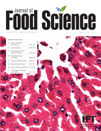
JOURNAL OF FOOD SCIENCE
Transforming Discoveries into Practical SolutionsJOURNAL OF FOOD SCIENCE, published by Wiley, is a premier journal dedicated to advancing the field of food science, bridging the gap between fundamental research and practical application. With an impressive impact factor reflecting its authoritative status, the journal is ranked in the Q1 quartile for Food Science in 2023 and boasts a Scopus ranking of #71 out of 389, placing it in the 81st percentile within Agricultural and Biological Sciences. First launched in 1936, the journal continues to serve as an essential platform for researchers, professionals, and students to disseminate innovative studies and reviews that address critical issues in food quality, safety, and technology. While not currently offering open access, its rigorous peer-review process ensures the dissemination of high-quality and impactful research. Researchers engaged in the vital disciplines of food science will find this journal indispensable for keeping abreast of cutting-edge developments in the field.
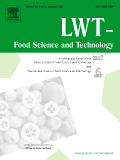
LWT-FOOD SCIENCE AND TECHNOLOGY
Exploring the science behind food quality.LWT - Food Science and Technology is a premier academic journal published by Elsevier, specializing in the multifaceted fields of food science and technology. With a distinguished presence since its inception in 1973, this journal has evolved to become a vital resource for researchers and professionals aiming to advance knowledge in food safety, preservation, processing, and sensory analysis. Currently ranked in the Q1 quartile of food science journals, it holds an impressive Scopus ranking of 22 out of 389 in the Agricultural and Biological Sciences category, placing it in the 94th percentile. While certain articles may be available via subscription, LWT is committed to disseminating cutting-edge research that enhances food quality and innovation. This journal not only serves as a critical platform for the exchange of scientific ideas but also addresses contemporary challenges in food technology, ensuring that it remains essential for scholars, industry professionals, and students alike seeking to contribute to and stay abreast of advancements in the field.

International Food Research Journal
Transforming Ideas into Impactful Food ResearchThe International Food Research Journal, published by UNIV PUTRA MALAYSIA PRESS, serves as a pivotal platform for disseminating innovative research within the field of food science. With an ISSN of 1985-4668 and an E-ISSN of 2231-7546, the journal has successfully established its presence since its inception in 2007, converging its findings through 2024. This esteemed journal holds a Q3 ranking in Food Science, illustrating its valuable contributions to the field as demonstrated by its Scopus rank of 276 out of 389, placing it in the 29th percentile among its peers in Agricultural and Biological Sciences. Although it operates under a traditional publishing model, its academic integrity and focus on high-quality research ensure that it remains a vital resource for researchers, professionals, and students eager to explore advances in food technology, nutrition, and safety. By encouraging interdisciplinary collaboration and critical dialogue, the International Food Research Journal plays an essential role in shaping the future of food science research.

ACS Food Science & Technology
Unveiling the Science Behind Every BiteACS Food Science & Technology is a premier peer-reviewed journal published by the American Chemical Society (ACS) that addresses the dynamic intersections of food science, chemistry, and technology. With its E-ISSN: 2692-1944, this journal aims to disseminate innovative research and comprehensive reviews that enhance understanding in fields such as analytical chemistry, organic chemistry, and general food science. Despite the absence of an Open Access model, its position in the Q2 quartile for multiple categories in 2023 underscores its significant impact on the scholarly landscape, ensuring researchers can access high-quality research pertinent to today's food challenges. With an expanding timeline of 2021 to 2024, ACS Food Science & Technology is poised to be an essential resource for advancing the scientific community's knowledge, fostering collaboration, and bridging gaps between academia and industry.